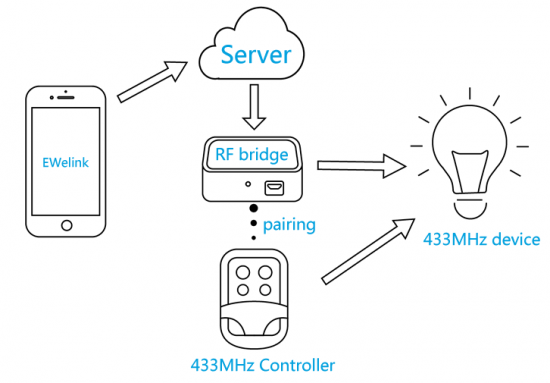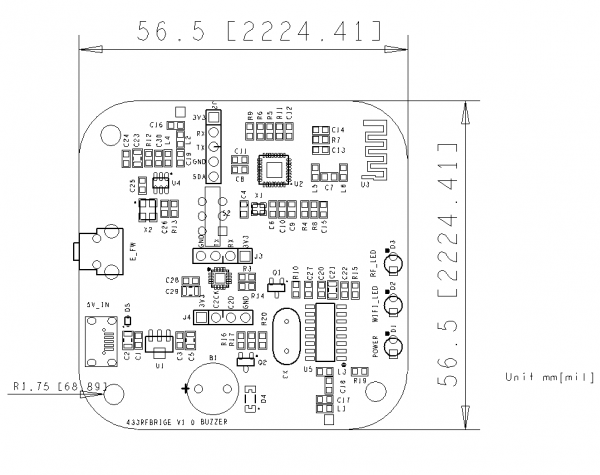Difference between revisions of "Sonoff RF Bridge 433"
m (→Useful Links) |
m (→Downloads) |
||
| Line 112: | Line 112: | ||
==Downloads== | ==Downloads== | ||
[[:File:Sonoff_RF_Bridge_433_Schematic.SCH.pdf | Sonoff RF Bridge 433 Schematic]] | [[:File:Sonoff_RF_Bridge_433_Schematic.SCH.pdf | Sonoff RF Bridge 433 Schematic]] | ||
| + | |||
| + | [[:File:RF万能收发模块串口协议_v1.0.pdf | RF万能收发模块串口协议_v1.0]] | ||
==Useful Links== | ==Useful Links== | ||
Revision as of 06:52, 4 July 2017
Contents
Overview
Sonoff RF Bridge 433 is an ultra low power consumption device that can convert 433.92MHz (433MHz) to WiFi. It's a bridge between 433MHz RF and WiFi, which can be added to iOS & Android App eWeLink. Users can firstly pair 433MHz devices with the RF Remote, then add their RF Remote to the App. Therefore, users can control the 433MHz devices through App eWeLink. It's specially designed for mobile device and IoT application.
From the picture, you can see the relations among the devices clearly. Firstly, you pair the 433MHz RF Remote controller with 433MHz device. Secondly, you add RF Bridge to App eWeLink. Thirdly, add the 433MHz RF Remote controller to RF Bridge via App, pair the buttons one by one. Then you can press the button on the App to turn on/off the 433MHz device remotely. One RF Bridge supports to add up to 4 RF Remote controllers.
You can add not only 1-4 buttons ordinary RF Remote to the RF Bridge on App, but also curtain RF Remote and Alarm.
Go shopping Sonoff RF Bridge 433 (SKU:IM170619001)
WIFI 2.4G Characteristics
- Support wireless 802.11 b/g/n/d/e/i/k/r standard
- Support STA/AP/STA+AP working modes
- Support WPA/WPA2, PSK and WP
- Built-in TCP/IP protocol stack
- Support multi-channel TCP client connection
- Support Wi-Fi Direct (P2P)
- Multi-queue management, make full use of 802.11e-compliant QoS priority
- Adaptive rate fallback algorithm sets the optimum transmission rate and Tx power based on actual SNR and packet loss information.
433.92MHz Wireless Characteristics
- Complete monolithic UHF receive/transmit
- Receive & transmit frequency: 433.92MHz
- Receive sensitivity: -107dBm
- Up to 10dBm transmit power
- Transmission rate: 10kbps
- Autotune without manual adjustment
- Ultra low RF antenna radiation
Electrical Characteristics
The device is powered by micro USB cable, and it supplies power to the system through 3.3V LDO chip.
Rated Parameters
| Power supply | Micro USB:+5V |
| System:3.6V | |
| I/O voltage | VSS - 0.3 ~ VDD + 0.3 |
| Node Temp. | +150℃ |
| Storage Temp. | -40℃ ~ +125℃ |
| Operating Temp. | -40℃ ~ +125℃ |
| Soldering Temp. | 260℃ |
Technical Parameters
| Name | Type | Description |
| Chip | ESP8285,EFM8BB1 | |
| Wi-Fi | Wireless Standard | IEEE 802.11b/g/n/d/e/i/k/r |
| Frequency | 2.412GHz-2.484GHz | |
| Transmit Power | 802.11b: +20±2dBm (@11Mbps) | |
| 802.11g: +17±2dBm (@54Mbps) | ||
| 802.11g: +14±2dBm (@HT20,MCS7) | ||
| Receiving Sensitivity | 802.11b: -91 dBm (@11Mbps ,CCK) | |
| 802.11g: -75 dBm (@54Mbps, OFDM) | ||
| 802.11n: -72 dBm (MCS7) | ||
| Antenna | 2.4G onboard antenna | |
| 433.92M | Working Frequency | 433.92MHz |
| Demodulation Bandwidth | 5000Hz | |
| Transmit Power | Transmitting mode: 12.5mA | |
| Idle mode: 3mA | ||
| Standby mode: 1uA | ||
| Receive Current | Continuous receiving mode: 3.9 ~ 4.5mA | |
| Idle mode: 390uA | ||
| Standby mode: 0.9uA | ||
| Hardware | Operating Voltage | 3.0 ~ 3.6V |
| GPIO drive of main chip | Max:12mA(ESP8285),12.5mA(EFM8BB1) | |
| Operating Current | Continue sending:70~200mA | |
| Normal working:30~200mA | ||
| Stand-by mode:<200uA |
Hardware
Downloads
Sonoff RF Bridge 433 Schematic
Useful Links
Wi-Fi Socket/Switch Fail to be Controlled Troubleshooting
Features wanted, bug report and discuss in Itead Smart Home Forum
 Notice
Notice
